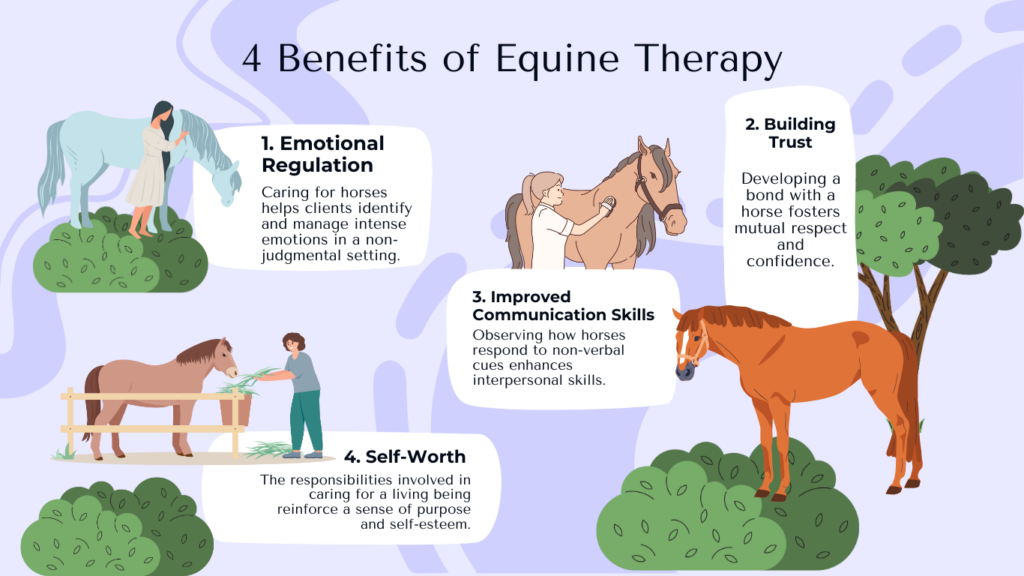Why Choose Thoroughbred Wellness and Recovery?
Thoroughbred Wellness and Recovery is a trusted resource for individuals seeking comprehensive care for relational trauma. With our unique blend of evidence-based therapies, holistic healing approaches, and a specialty in equine-assisted therapy, our center provides a transformative path to recovery.
Here’s why Thoroughbred Wellness and Recovery is the choice for those looking to heal from trauma and rebuild their lives.
Personalized Treatment Plans
Every individual’s experience with trauma is unique, and Thoroughbred Wellness and Recovery recognizes this by offering customized treatment plans tailored to each guest’s specific needs.
These plans integrate various therapeutic modalities to address the physical, emotional, and psychological aspects of trauma.
Whether the focus is on managing symptoms of anxiety, depression, or co-occurring substance use disorders, guests receive care that aligns with their personal recovery goals.
Experienced Providers
The treatment team at Thoroughbred Wellness and Recovery includes licensed clinicians with extensive expertise in addressing complex mental health issues and addiction.
Our approach combines trauma-informed care with evidence-based interventions such as Eye Movement Desensitization and Reprocessing (EMDR), Accelerated Resolution Therapy (ART), psychodrama and Brainspotting.
This ensures that guests receive the most effective methods for processing and overcoming their trauma.
Holistic Healing
Healing from relational trauma requires more than traditional talk therapy. Thoroughbred Wellness and Recovery integrates holistic modalities to promote overall well-being.
These include:
- Yoga and Meditation: To foster mindfulness and reduce stress.
- Art Therapy: To provide a creative outlet for processing emotions.
- Breathwork: To regulate the nervous system and improve emotional resilience.
These practices complement traditional therapies, creating a comprehensive approach to recovery that nurtures the mind, body, and spirit.
Equine-Assisted Therapy: A Unique Path to Healing
One of the standout features of Thoroughbred Wellness and Recovery is its equine-assisted therapy program. This innovative approach uses interactions with horses to help guests develop essential life skills while fostering emotional growth.
How Equine Therapy Works
Horses are highly intuitive animals that naturally respond to human emotions. During equine-assisted therapy sessions, guests engage in activities such as grooming, feeding, and leading horses under the guidance of trained therapists.
These interactions encourage self-awareness, emotional regulation, and trust-building—key components of trauma recovery.

- Emotional Regulation: Caring for horses helps guests identify and manage intense emotions in a non-judgmental setting.
- Building Trust: Developing a bond with a horse fosters mutual respect and confidence.
- Improved Communication Skills: Observing how horses respond to non-verbal cues enhances interpersonal skills.
- Self-Worth: The responsibilities involved in caring for a living being reinforce a sense of purpose and self-esteem.
Equine therapy not only aids in emotional healing but also equips guests with coping strategies that extend into their daily lives.
What Is Relational Trauma?
Relational trauma—sometimes referred to as attachment trauma or complex trauma—occurs when an individual experiences prolonged emotional, psychological, or physical harm within significant relationships.
These relationships often include caregivers, romantic partners, or close family members. Unlike single-incident traumas such as accidents or natural disasters, relational trauma stems from repeated harmful interactions over time.
Common causes of relational trauma include:
- Childhood neglect or abuse: Dysfunctional family dynamics can leave lasting scars on emotional development.
- Domestic violence: Survivors of intimate partner abuse often carry deep relational wounds.
- Abandonment: Repeated rejection or absence by loved ones can lead to profound feelings of insecurity and mistrust.
Signs and Symptoms of Relational Trauma
Relational trauma manifests in various ways, often affecting interpersonal relationships and emotional health.
Common signs include:
- Difficulty trusting others or forming secure attachments.
- Intense fear of abandonment or rejection.
- Emotional dysregulation, such as mood swings or numbness.
- Persistent feelings of low self-worth and negative self-image.
- Avoidance of situations that trigger memories of past relational harm.
These symptoms can distort thought patterns and coping mechanisms, making navigating relationships and daily life challenging.
Why Does Relational Trauma Occur?
Relational trauma often originates in childhood but can develop at any stage of life. When caregivers fail to provide consistent love and security—or worse, inflict harm—it disrupts the ability to form healthy attachments.
The disruption can lead to a lifelong struggle with trust, vulnerability, and emotional regulation. Similarly, traumatic experiences like domestic violence or repeated abandonment create cycles of pain that are difficult to break without professional intervention.
Types of Relational Trauma
Relational trauma can be categorized into:
- Complex Trauma: Results from ongoing abuse or neglect within close relationships.
- Attachment Trauma: Specifically tied to disruptions in early caregiving relationships.
- Interpersonal Trauma: Occurs in adult relationships, such as intimate partner violence.
Each type requires tailored treatment approaches to address the unique needs of survivors.
How Relational Trauma Impacts Atlanta Residents
In Atlanta alone, relational trauma affects countless individuals navigating the aftermath of abusive relationships or neglectful caregiving environments. Statistics reveal that over two-thirds of children report at least one traumatic event by age 16—a figure that underscores the prevalence of interpersonal harm.
Women are disproportionately affected by relational trauma due to higher rates of domestic violence and sexual assault.
Atlanta’s diverse population faces unique challenges when it comes to accessing mental health treatment. Thoroughbred Wellness and Recovery bridges this gap by offering accessible outpatient treatment options like PHP and IOP that cater to busy professionals, parents, adolescents transitioning from inpatient care, veterans, first responders, and college students.

The Importance of Treating Relational Trauma
Untreated relational trauma can contribute to mental health disorders like depression, anxiety disorders, personality disorders, and post-traumatic stress disorder (PTSD). It is also a significant risk factor for substance abuse, as individuals may turn to drugs or alcohol to cope with emotional pain.
Addressing relational trauma is vital for breaking these cycles and fostering sustainable recovery.
Thoroughbred Wellness and Recovery recognizes the interconnectedness of relational trauma with addiction and mental health issues.
Guests can achieve lasting healing by treating both simultaneously through evidence-based modalities like cognitive-behavioral therapy (CBT), dialectical behavior therapy (DBT), and eye movement desensitization and reprocessing (EMDR).
Treatment Options for Relational Trauma in Atlanta
At Thoroughbred Wellness and Recovery near Atlanta, we offer comprehensive treatment programs designed to meet the unique needs of each individual. Our levels of care include:
- Partial Hospitalization Program (PHP) provides structured support while allowing participants to return home or stay in sober living environments. Sessions are held five days a week for approximately four hours each day.
- Intensive Outpatient Program (IOP) offers flexibility for individuals who balance recovery with daily responsibilities. This program focuses on group and individual therapy, mindfulness practices, and developing coping skills.
- Evening Intensive Outpatient Program offers structured treatment for individuals requiring a higher level of care without full hospitalization. Sessions typically occur in the evenings, making it convenient for those working or with daytime responsibilities.
- Outpatient Program provides supportive treatment for individuals dealing with mental health or substance use disorders who do not require full-time care. Participants attend therapeutic sessions on a scheduled basis—usually a few times a week—while living at home.

Treatment Services for Relational Trauma
Healing from relational trauma requires a comprehensive approach tailored to each individual’s unique experiences and needs. At our center, we offer a range of treatment services specifically designed to address the complexities of relational trauma, including emotional, psychological, and physical aspects.
Trauma-Focused Therapies
We incorporate evidence-based approaches such as:
- EMDR helps individuals process and integrate traumatic memories by using bilateral stimulation, which allows guests to reprocess distressing thoughts and feelings, leading to reduced symptoms of PTSD and increased emotional well-being.
- Dialectical Behavioral Therapy (DBT) combines cognitive-behavioral techniques with mindfulness practices to help individuals regulate their emotions, improve interpersonal effectiveness, and develop distress tolerance skills, particularly for those struggling with intense emotions and high-risk behaviors.
- Cognitive Behavioral Therapy (CBT) allows individuals to identify and change negative thought patterns and behaviors, helping to alleviate symptoms of anxiety and depression while promoting healthier coping mechanisms.
- Psychodrama Therapy is a therapeutic approach that uses role-playing and dramatic techniques to help guests explore and express their emotions, gain insight into their experiences, and improve interpersonal relationships.
- Resolution Therapy provides a framework for guests to resolve internal conflicts and emotional struggles by focusing on solutions and addressing the underlying causes of their distress in a supportive environment.
- Rapid Resolution Therapy is an innovative therapeutic technique that aims to help guests achieve lasting changes in a shorter timeframe by addressing traumatic memories and emotions quickly, allowing them to move forward with greater ease and resilience.
Holistic Interventions
Healing involves more than addressing symptoms; it requires nurturing the mind, body, and spirit. Our holistic approach includes yoga, meditation, breathwork, equine-assisted therapy, and fitness activities.
Building Coping Skills through Therapy
Recovery from relational trauma involves learning effective coping mechanisms to manage triggers and rebuild self-esteem. At Thoroughbred Wellness and Recovery:
- Group therapy sessions foster connection among peers who share similar struggles.
- Individual therapy addresses thought patterns that perpetuate self-blame or mistrust.
- Family therapy helps repair strained relationships while setting healthy boundaries.
Our goal is not just symptom relief but empowerment—helping guests regain control over their lives through practical coping strategies.
Begin Your Healing Journey
Relational trauma may leave deep scars—but those scars don’t have to define your future. At Thoroughbred Wellness and Recovery near Atlanta, Georgia, we’re here to guide you toward healing through compassionate care explicitly tailored to your needs.
If you’re ready to take the first step toward reclaiming your well-being after traumatic experiences with loved ones or caregivers—whether through outpatient treatment programs like PHP or IOP—reach out today at 770-564-4856.
Your path forward starts here: with evidence-based therapies designed to treat symptoms and transform lives. Don’t let relational trauma hold you back—find hope at Thoroughbred Wellness and Recovery!










